#verse [twentieth century.]
Note
what makes a poem a poem? does it have to be written in a certain way? is this question a poem if i want it to be?
Fun question! This is just my personal sense as an avid reader and less-avid writer of poetry, but for me it’s useful to distinguish (roughly) between poetry as a genre and poetry as an attitude or philosophy through which language and the world can be understood. And of course these two go hand in hand. I see poetry the genre as essentially a type of literature where we as readers are signaled, somehow, to pay closer attention to language, to rhythm, to sound, to syntax, to images, and to meaning. That attentive posture is the “attitude” of broader poetic thinking, and while it’s most commonly applied to appreciate work that’s been written for that purpose, there’s nothing stopping us from applying that attentiveness elsewhere. Everywhere, even! That’s how you eventually end up writing poetry for yourself, after all. There’s a quote from Mary Ruefle floating around on here that a lot of folks have probably already seen, but it immediately comes to mind with this ask:
“And when you think about it, poets always want us to be moved by something, until in the end, you begin to suspect that a poet is someone who is moved by everything, who just stands in front of the world and weeps and laughs and laughs and weeps.”
Similarly, after adopting the attentive posture of poetics, there’s plenty of things that can feel or sound like a poem, even when they perhaps were not written with that purpose in mind. I’ve seen a couple of these “found poems” on here that are quite fun—this one, for example. The meaning and enjoyment you may derive from the language of a found poem isn’t any less real than that derived from a poem written for explicitly poetic purposes, so I don’t see why it shouldn’t be called poetry.
That said, I do think that if you’re going to go out and start looking for poetry everywhere, it’s still important to have a foundation in the actual language work of it all. Now, this doesn’t mean it has to be “written in a certain way” at all! But it does mean that in order to cultivate the attentiveness that’s vital to poetry, one needs to understand what makes language tick, down at its most basic levels. It will make you better at reading poetry, better at writing it, and better at spotting it out in the wild.
Mary Oliver’s A Poetry Handbook is an extraordinary resource to new writers and readers, and a great read for more experienced folks as well. Mary Oliver’s most popular poems are all to my knowledge in free verse, and yet you might be surprised to find her deep appreciation for metrical verse (patterns of stressed/unstressed syllables), as well as for the most minute devices of sound. In discussing the so-called poetry of the past, she writes,
“Acquaintance with the main body of English poetry is absolutely essential—it is the whole cake, while what has been written in the last hundred years or so, without meter, is no more than an icing. And, indeed, I do not really mean an acquaintanceship—I mean an engrossed and able affinity with metrical verse. To be without this felt sensitivity to a poem as a structure of lines and rhythmic energy and repetitive sound is to be forever less equipped, less deft than the poet who dreams of making a new thing can afford to be.”
In another section, after devoting lots of attention to the sounds at work in Robert Frost’s “Stopping by Woods on a Snowy Evening”, she writes,
“Everything transcends from the confines of its initial meaning; it is not only the transcendence in meaning but the sound of the transcendence that enables it to work. With the wrong sounds, it could not have happened.”
I hope all this helps to get across my opinion that what makes a poem a poem is not just about the author's intention, and not just about meaning (intended or attributed), but also about sound and rhythm and language and history, all coalescing into something that rises above the din of a language we would otherwise grow tired of while out in our day-to-day lives.
I'll always have more to say but I'm cutting myself off here! Thanks for the ask
#ask#discussion#does this even answer the question? lol#anyways even if you're not huge on mary oliver i still highly recommend a poetry handbook#i admit her poetry is only to my taste about 60-70% of the time. but her handbook is a great resource and can stand alone#i actually think oliver wrote a whole other book just about metrical verse too. for people who are into that#also if you're someone who's less interested in the question 'what is poetry?' and more into questions like#why is poetry? can poetry survive? what the fuck happened to poetics in the twentieth century?#i recommend the witness of poetry by czeslaw milosz#an older book—actually a collection of lectures—but an absolute game-changer for me#not a poll
467 notes
·
View notes
Note
In a modern AU what do you think the DonQuixote Brothers occupations would be? (In a world where Doflamingo isn't doing some illegal shit 🙄) I personally headcannon Doflamingo being the head of a big avant-garde fashion company, cause you know... String fruit... He's got funky clothes... He cannonicly sewed his ass a clone. I feel like it fits. (Also with this head cannon I imagine him dressing Rosi up all the time as kids. And occasionally as teens and adults when they go out together, but Rosi is much less willing then. But still let's him.). But I'm rather stumped on Rosi's, I suppose he could just be a police officer but idk I'm very undecided.
Also any headcannons on what their relationship dynamics would be in a modern AU?
ooc ;
This is such a good freaking ask. I loveee this. I do like the idea of Doffy being a big fashion exec, too! In an AU like that, I like to think that Rosi would still be a Navy man. Or maybe FBI. And is eventually honorably discharged after receiving a severe injury, before probably ending up working for the family again, or possibly living a quiet life where's chronically proud of his adopted son, who's absolutely killing this pre-med thing.
In my main modern AU, it'll probably depend on how things go once I start roleplaying with a Law and Doflamingo in that kind of setting but... my personal sandbox idea is that Doflamingo is most certainly involved in mob, black market and very illegal activities. The boys grew up together in this scenario, but Doflamingo still ends up killing their father as a means of protecting his way of life, that Rosinante has long been dragged into himself.
I figure that Rosinante very much feels that he has no choice but to participate in what the Family is doing. He resents his brother for it, and for what he did to their father. Doflamingo says he did it to protect them-- after all, if their house of cards came tumbling down, Doflamingo wouldn't be the only one falling with it.
And if it were just Rosinante going to prison, he might accept that punishment for all the sins that his family has committed. But by now, the Donquixote family is even more deeply involved in deals with even larger crime families, and Rosinante knows that to stop now, or to confess, would mean certain imprisonment or death for Doflamingo, too. Even more so.
Rosinante has strong convictions, yes. He knows that their entire life is irredeemably fucked. But as much as he resents his situation, and Doflamingo more days than not, he just can't pull the fucking trigger.
Anyway, I'm obsessed with AUs where Rosinante is even more morally conflicted than he is in canon, since I strongly feel that he would be-- had he and Doflamingo been given the opportunity to grow up together.
Rosinante still holds in his heart that one day, their broken little family will find better than the life they're living. Doflamingo's definition of "better" isn't based on location, however-- it's all in the elevation.
Things will be better when their family is at their rightful place, at the top, with the throat of the city of Dressrosa under the Donquixote family's collective boot.
#this got long dang. i'm so sorry lmao.#i just love these AUs what can i sayyyyy#donquixote 'grr youre better than this grr' rosinante. who is also at his criminal older brother's heels at literally every turn.#because he loves him too much to do the right thing. which... i mean#just thinking of their dysfunctional little family and kicking my feet#THANK YOU for this#verse: twentieth century blues (modern)#out of character#ask me: answered#thoughts and headcanons#obsessivemuch
3 notes
·
View notes
Photo

“Love After Love” by Saint Lucian poet Derek Walcott (1930–2017), from his Collected Poems 1948–1984
#derek walcott#poetry#modern poetry#influences#twentieth century#free verse#self acceptance#poem#black poetry#black literature
5 notes
·
View notes
Text
The Illiterate
William Meredith
Touching your goodness, I am like a man
Who turns a letter over in his hand
And you might think this was because the hand
Was unfamiliar but, truth is, the man
Has never had a letter from anyone;
And now he is both afraid of what it means
And ashamed because he has no other means
To find out what it says than to ask someone.
His uncle could have left the farm to him,
Or his parents died before he sent them word,
Or the dark girl changed and want him for beloved.
Afraid and letter-proud, he keeps it with him.
What would you call his feeling for the words
That keep him rich and orphaned and beloved?
.
#what would you call his feeling for the words / That kept him rich and orphaned and beloved?#the RHYTHM here but also the turns and the way the turns play with the rhythm#dudes it's just. my heart. my heart when the blank verse DOES A THING LIKE THIS.#poetry#US poetry#american poetry#william meredith#twentieth century poetry
2 notes
·
View notes
Text
alright fuck this I’m making a TIMELINE. and a FACT SHEET. it will not be in order. Nor will it actually track dates really. Mostly it’s going to contain the seeds of my theories. I’m red stringing this Shit via tumblr post on mobile.
TIMELINE:
Magnus Institute fire: 1999
Windows NT 4.0 (the Windows NT that was the commercial predecessor to Windows 95) was released to retail in 1996 (with the final version released in 2001) so Freddy has been creeping around the web since around the time the Institute burned down
Jon, Martin, and probable Jonah Norris, Chester, and Augustus started actively reading roughly 1/30 statements entries out loud ~a year ago, according to Alice
Statements Entries so far are dated to May 2022, and it’s implied that Freddy collects them more or less as they appear, so as far as rough estimates for when tmp is set, it’s nowish, or just a bit earlier than now (similar to how tma was)
My kingdom for an ARG player who can hook me up with the founding date of the OIAR and the dates on those Magnus Institute records, just cuz I’m curious
SHIT WE KNOW:
Jonah Magnus exist(s/ed) in SOME form in this world, and built an institution designed to research the paranormal. That institution burned down and cleared of all records. Unclear exactly when the clearing happened.
The voices in the computer are the same as Martin Blackwood’s and Jonathan Sims’s
The OIAR has a department (this one) dedicated entirely to sorting weird shit scraped from online with an obsessive specificity
Everyone who works in this department wasn’t forced to be here and isn’t forced to stay, but all of them do have something that guided them to this position and is keeping them here
There is supernatural shit happening here in this world right now
Annabelle Cane said that the rift under Hilltop Road was a rift in reality - time, space, dimensions
She also said that the Fears would be following the voices that were woven into the web made of the tapes
In the TMA-verse, the Fears had a penchant for spreading themselves around via books (and then someone stupid idiot motherfucking dusty ass book collecting rat old bastard avatar of the whore biggest clown in the circus cowboy— starting slapping a label on em
SHIT THAT IS STILL A ???:
Did the fears exist in this world for an extended period of time, or have they only recently appeared? All the dates we have for statements entries are recent, but there was at the very least some FUCKED UP SHIT happening before the jmart+Jimmy Magma squad popped up
Did Robert Smirk build batshit crazy buildings and also a panopticon under London?
Was Magnus fear-aligned? Was the Institute? Or was it just a place for fucked up research?
Are there alternate-reality versions of any beloved TMA recurring cast members running about?
Was the og TMA world the place where the Fears started? Or had they already spread?
How far have they made it at this point? Is this the first new world post-archives-crew? Or are we several down the chain?
COLLECTION OF FACTS INTO BATSHIT THEORIES:
The Fears have been Updated for the Twentieth (not twenty-first, rip to Colin) Century and now they have infused themselves into computer systems via Jon’s tapes letting them encode themselves in a new and fun way (I am not 100% sure how tapes work besides magnets somehow, but I DO know that early computers used them for data tracking, which makes enough dream-logic sense for me) and are thus able to hack themselves into forum posts and also spy on the whole world via one (1) government computer system
Panopticon screenshot happened in March 2021. First two statements are May 2022. Alice said the voices started showing up about a year ago. So even if the Fears were already here, JMart are here now once more to lend their voices to the verbal record of Fear
Speaking of the Fears already being here. If the Rift was also for Time, I’m sure the Web could have figured out a way to drag the Squad back along the timeline while somehow leaving jmart behind
OIAR is EITHER. The Fears (Web specifically) preparing a perfect funnel-spider web trap for JMart when they did show up (oh voices? tapes? telling fear stories? here you go motherfuckers) or someone’s Leitner/Smirk/Magnus-ass attempt to wrangle all the trauma under one roof. Either way I’m p sure it is Web-ish-aligned, if the Fears even exist in this world in the way we’re used to seeing them
If we’ve got two grown up paranormal guinea pigs, AND a bouchard running around, and all of them are here because of Some Sort Of Reason, and are Still Here Even Though They Could Leave, I assume everyone else is too. I wonder if they all have some tie to this world’s Institute, or if they’ve all had encounters, or were selected based on their compatibility with the OIAR’s aims
Speaking of which
WHAT IS THE OIAR? Cuz this part of it is clearly kinda similar to the Archives in terms of collecting and sorting statements. Is there more of it? What do those people do? Do they use these sorted entries somehow? Also why tf do they have do work overnight????
#tmagp#the magnus protocol#tmagp spoilers#tma spoilers#the magnus protocol spoilers#the web#tmagp meta#tmagp speculation#tmagp theory#OIAR#everyone start yelling back at me I am THRIVING I have needed something to throw my conspiracy theory energy at
159 notes
·
View notes
Text


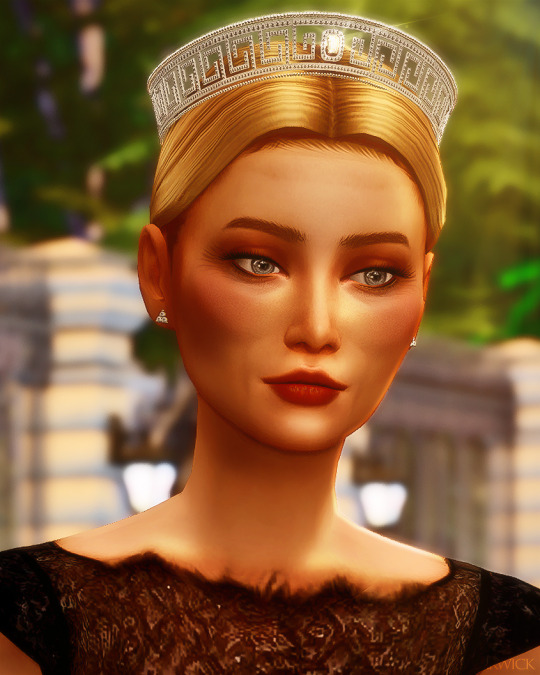

Sunderland's Royal Jewel Vault (18/∞) ♛
↬ Countess Wynn's Meander Tiara
The majority of the tiaras in the Sunderlandian collection were inherited through members of King Louis V's family, mainly previous queens Matilda Mary, Anne, and Katherine. This meander tiara however represents the current Wariwcks' French heritage, as it belonged to Queen Irene's mother, Marguerite Wynn.
Countess Wynn was born in 1914 as Marguerite Delphine Lucie Chevrier. She was the eldest of four children born to industrialist
Phillipe Édouard Chervrier (1880 - 1950) and his El Salvadoran wife, Consuelo Romana Gomez (1892 - 1979). Margurite's family claims ancestry from both French and Spanish nobility, although the bulk of their impressive fortune was derived from Phillipe's ceramics factory in the south of France. Much of Margurite's early life was disrupted by the First World War, during which the Chevriers settled in Mexico City with Consuelo's sister.
Following the war, Marguerite flourished in high Parisian society, becoming well-versed in the arts and fluent in several languages, including English and Spanish. Expected to marry into the French aristocracy, Marguerite made waves by instead marrying John Wynn (1911 - 1973), a career soldier from Sunderland whose great family had fallen on hard times following the deaths of John's three older brothers in the war. When the couple met in 1931, John was on a mindless trek across Europe, in search of a wealthy bride. Despite their differing backgrounds, Marguerite was smitten by John's optimism and good humour. The pair married a year later, with John even converting to Catholicism to appease Marguerite's parents.
Their wedding was held at the Chapel of the Palace of Versailles, one of the last grand society affairs of interwar Paris. The tiara, which featured a Greek key design punctuated by a central emerald-cut yellow diamond, was among Marguarite's wedding gifts. The jewel is ambiguous in origin but is agreed to be an early twentieth-century creation, likely from Cartier. It became a useful tool in Margurite's arsenal as she erupted in Sunderland as one of the country's wealthiest society ladies. Pearlie, as she became known, was noted to be arrogant, intelligent, and ravishing.
Pearlie is more "royal" than the rest of us combined. She drenches herself in jewels as if she were the ghost of the last Tsarina. — Queen Katherine, 1970
The Countess owned the tiara until 1968, when she gave it to her youngest daughter, Lady Irene, also as a wedding present. Irene's marriage to the future King Louis V was Pearlie's greatest life achievement and she became increasingly boastful. Maman Wynn, as she was called by the press and public, was known to meddle in royal affairs, especially the personal lives of her daughter and son-in-law. By the early 1980s, she was on bad terms with both.
Irene was never seen wearing her mother's tiara, but she kept it in her own personal possession for almost thirty years. In 1997, Irene continued the tradition by gifting the tiara to her only daughter, Princess Jacqueline, ahead of her wedding to Lawrence Belmont. The wedding was coincidently the last public appearance of the old Countess Wynn. She died peacefully at Chester Palace the same winter. Since then, Jacqueline has worn the tiara regularly at state functions and in official portraits. It's among the princess's most cherished pieces.
The Countess Wynn wears the tiara in a portrait, circa October 1943, eight years before the birth of her youngest daughter, Queen Irene
HRH Princess Jacqueline wears the tiara while attending a gala dinner & dance in July 2026
#warwick.jewels#✨#ch: irene#ch: jacqueline#ts4#ts4 story#ts4 royal#ts4 storytelling#ts4 edit#ts4 royal legacy#ts4 legacy#ts4 royalty#ts4 monarchy#ts4 screenshots
61 notes
·
View notes
Text
Reading the Collected Poems of Ursula K. Le Guin (1929-2018). In case you were wondering whether Le Guin--long recognized as one of the twentieth century's finest science fiction authors--was also one of the twentieth century's finest poets...yes. Yes, she absolutely was. Nearly every line she wrote is imbued with a ferocious joy. And her Taoist-informed ecological consciousness, her awareness that humans who destroy nature also destroy themselves, is just as keen in her verse as in, say, The Word for World is Forest or The Dispossessed. The collection (which features a long introduction by the late Harold Bloom, a close friend of Le Guin's) is a marvelous insight into a marvelous mind.
77 notes
·
View notes
Text

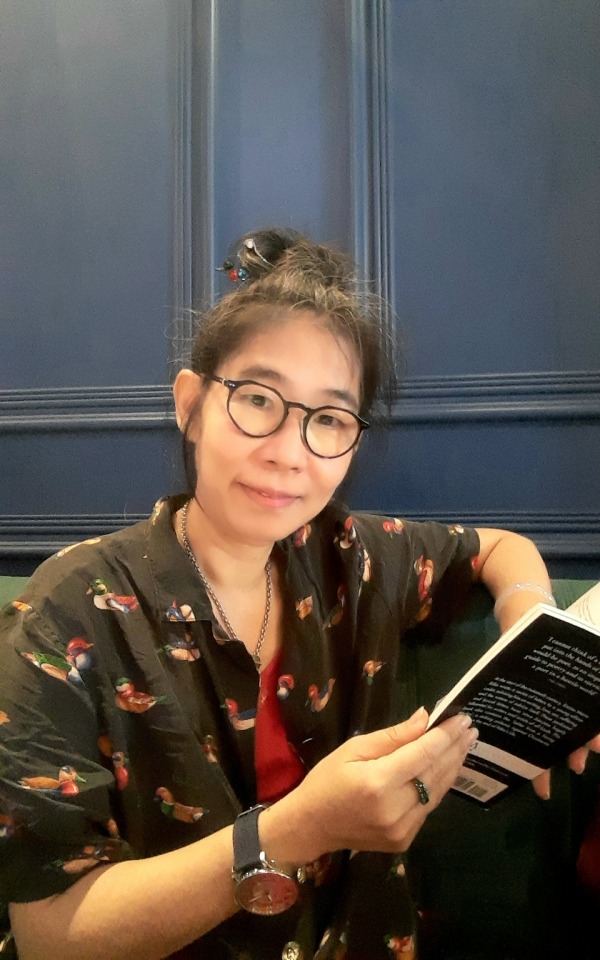











下午我又去咖啡店做些我的皮雕工作、看書和避暑 lol … 熱到想要成天都浸泡在俱樂部的游泳池裡。 hahaha
In the afternoon I went to the coffee shop again for doing a part of my leather works, read and escape the heat lol…it was so hot that I wanted to soak in the club's swimming pool all day long. hahaha 😁😆😛 Lan~*
Rainer Maria Rilke 《Letters to a Young Poet》
譯者:Charlie Louth (Translator)
出版社:PENGUIN BOOKS LTD.
里爾克: 軍旗手、致年青詩人十封信 (中文版)
The Love and Death of Cornet Christopher Rilke/ Letters to a Young Poet
作者:萊納.瑪利亞.里爾克; 張錯/ 評析
譯者:張錯
出版社:商周出版
萊納·瑪利亞·里爾克(Rainer Maria Rilke,1875-1926)在慕尼黑和布拉格學習文學、藝術史和哲學,通常被認為是二十世紀最偉大的德語詩人之一。他最著名的兩首詩集是《俄耳甫斯十四行詩》和《杜伊諾輓歌》。他最著名的兩部散文作品是《給一位年輕詩人的信》和半自傳《馬爾特·勞裡茲·布里格的筆記本》。
Rainer Maria Rilke (1875–1926) studied literature, art history, and philosophy in both Munich and Prague and is often considered one of the German language's greatest twentieth-century poets. His two most famous verse sequences are the Sonnets to Orpheus and the Duino Elegies; his two most famous prose works are Letters to a Young Poet and the semiautobiographical The Notebooks of Malte Laurids Brigge.
查理·勞斯 (Charlie Louth) 是牛津大學女王學院的研究員,以德語授課。他是《荷爾德林與翻譯動力》一書的作者。
Charlie Louth is a fellow at Queen's College, Oxford, where he lectures in German. He is the author of Hölderlin and the Dynamics of Translation.
路易斯‧海德 (Lewis Hyde) 是暢銷書《禮物》(The Gift) 的作者。海德是麥克阿瑟研究員、哈佛大學大學部學生創意寫作主任,也是哈佛大學伯克曼網路與社會中心的研究員。他住在麻薩諸塞州劍橋和俄亥俄州甘比爾。
Lewis Hyde is the author of the hundred-million-copy bestseller The Gift. A MacArthur fellow and former director of undergraduate creative writing at Harvard University, Hyde is a fellow at Harvard's Berkman Center for Internet and Society. He lives in Cambridge, Massachusetts, and Gambier, Ohio.
萊納·瑪利亞·里爾克(Rainer Maria Rilke)寫給一位有抱負的年輕詩人的有力感人的信。 二十世紀初, 里爾克 (Rainer Maria Rilke)給一位年輕的軍官學員寫了一系列信,在寫作、愛情、性、痛苦以及建議本身的性質方面向他提出建議。這些深刻而抒情的信件從此對包括女神卡卡和佩蒂·史密斯在內的幾代作家和藝術家產生了巨大影響。裡爾克的信充滿了誠實、優雅和對作為藝術家常常伴隨的孤獨的深刻理解,是靈感和安慰的無盡源泉。劉易斯·海德的新介紹探討了這些信件的寫作背景,以及作者如何將孤獨視為一種創造力。該版本也收錄了里爾克的晚期作品《青年工人的來信》。 80 多年來,企鵝出版社一直是英語世界領先的經典文學出版商。企鵝經典 (Penguin Classics) 擁有 1,700 多本圖書,代表了全球書架上的各個歷史時期、跨流派和學科的最佳作品。讀者相信該系列提供的權威文本由傑出學者和當代作家的介紹和註釋以及獲獎翻譯家的最新翻譯增強。
Rainer Maria Rilke’s powerfully touching letters to an aspiring young poet. At the start of the twentieth century, Rainer Maria Rilke wrote a series of letters to a young officer cadet, advising him on writing, love, sex, suffering, and the nature of advice itself. These profound and lyrical letters have since become hugely influential for generations of writers and artists of all kinds, including Lady Gaga and Patti Smith. With honesty, elegance, and a deep understanding of the loneliness that often comes with being an artist, Rilke’s letters are an endless source of inspiration and comfort. Lewis Hyde’s new introduction explores the context in which these letters were written and how the author embraced his isolation as a creative force. This edition also includes Rilke’s later work The Letter from the Young Worker. For more than 80 years, Penguin has been the leading publisher of classic literature in the English-speaking world. With more than 1,700 titles, Penguin Classics represents a global bookshelf of the best works throughout history and across genres and disciplines. Readers trust the series to provide authoritative texts enhanced by introductions and notes by distinguished scholars and contemporary authors, as well as up-to-date translations by award-winning translators.
#chu lan#朱蘭皮藝#fine craft artist#leather art artist#beautiful life#hot summer#rainer maria rilke#給一位年輕詩人的信#letters to a young poet#里爾克: 軍旗手、致年青詩人十封信 (中文版)
32 notes
·
View notes
Text
"In 1946, the term 'homosexuals' appeared for the first time in an English Bible. This new figure appeared in a list of sinners barred--according to a verse in the Apostles Paul's first epistle to the Corinthians--from inheriting the kingdom of God. The word change was made by leading Bible scholars, members of the translation committee that labored for over a decade to produce the Revised Standard Version (RSV) of the Bible. With an approach inspired by text-critical scholarship, many of their choices upset readers of the older King James Version, the favored Bible of Protestant America since the colonial era. Amid the outrage over other changes--to the red-letter words of Jesus and the old Shakespearean idiom--another modernizing innovation went virtual unremarked. Two enigmatic Greek nouns, referenced in the King James as 'effeminate' and 'abusers of themselves with mankind,' now appeared as a single, streamlined 'homosexual.' Subsequent Bible commentaries approached the new term as age-old tradition...
Some Bible readers, however, responded with surprise to this textual change. In everyday use, the verse in I Corinthians had other meanings. The author of a 1956 advice book on how to write sermons recounted the embarrassing tale of one minister's well-loved sermon. That sermon, delivered on various occasions, expanded on the 'general meaning' of the Apostle Paul's reference to the 'effeminate,' which the pastor took as warning against 'the soft, the pliable, those who take the easy road.' The take-away point was that Christians must undertake the difficult path of faith. It was a fine sermon, or so the pastor thought, until he read the RSV. He discovered 'to his amazement and chagrin; that 'effeminate' was translated 'homosexuals.' The confusion was a lesson, the author of this advice book chided, on the need to use recent translations. A check through earlier Bible commentaries confirms that outdated reference tools may indeed have contributed to this pastor's error. An eariler edition of The Interpreter's Bible, published in 1929, said nothing at all about homosexuality in its commentary on the same verse in I Corinthians. It noted that the Apostle Paul was keenly aware of the 'idolatry and immorality' of the pagan world. However, the named vice that so perturbed the apostle was 'self indulgence of appetite and speech,' an interpretation that more readily fit with the pastor's call to a disciplined faith. If Christianity did indeed set itself against homosexuality from the first, then this popular Christian reference text neglected to make that prohibition clear.
Several scholars of American religion have puzzled over the peculiar silences of early twentieth-century Christian texts on the topic of same-sex sexuality. After surveying the published Christian literature of that time, Randall Balmer and Lauren Winner concluded that during those decades, 'the safest thing to say about homosexuality was nothing.' They note that even the published commentary on 'sodomy,' which would seem to be the clearest antecedent to later talk about homosexuality, yielded little that would illumine a long tradition of same-sex regulation. Although many Bible reference tools mentioned that damnable 'sin of Sodom,' the muddled and circular commentary on this 'loathsome vice' offered little that clarified its nature. Historian Rebecca Davis, on her own hunt to find Christian teachings about homosexuality, similarly notes the profound absence in early and mid-twentieth century Protestant literature--and especially in the writing by conservative fundamentalists. 'The extant printed record,' she observes, 'suggests that they avoided discussions of homosexuality almost entirely.' Adding further substance to this void are the findings from Alfred Kinsey's study of the sexual behavior of white American men, conducted between 1936 and 1946. The study suggested that Christians, although well acquainted with the sinfulness of masturbation and premarital intercourse, knew very little about what their churches had to say about same-sex acts. 'There has not been so frequent or so free discussion of the sinfulness of the homosexual in religious literature,' Kinsey wrote. 'Consequently, it is not unusual to find even devoutly religious persons who become involved in the homosexual without any clear understanding of the church's attitude on the subject.' Before the 1940s, the Bible's seemingly plain condemnation of homosexuality was not plain at all.
...
What this book [Reforming Sodom] shows is that the broad common sense about the Bible's specifically same-sex meaning was an invention of the twentieth century. Today's antihomosexual animus, that is, is not the singular residue of an ancient damnation. Rather, it is the product of a more complex modern synthesis. To find the influential generators of that synthesis, moreover, we should look not to fundamentalist preachers but to their counterparts. Religious liberals, urbane modernizers of the twentieth century, studiously un-muddled the confused category of 'sodomitical sin' and assigned to it a singular same-sex meaning. The ideas informing this shift germinated out of the therapeutic sciences of psychiatry and psychology, an emerging field of the late nineteenth century that promised scientific frameworks for measuring and studying human sexual behavior. Liberal Protestants were early adopters of these scientific insights, which percolated through various early twentieth-century projects of moral reform. Among the yield from the convivial pairing of medicine and morality was the midcentury translation of the RSV. The newly focused homosexual prohibitions evidenced the grafting of new therapeutic terms onto ancient roots. The scores of subsequent Bible translations produced in later decades adopted and sharpened the RSV's durable precedent. In the shelves of late twentieth-century translations and commentaries--none more influential than the 1978 New International Version, which quickly displaced the King James as America's best-selling Bible--American Christians read what might be called a 'homosexualized' Bible. Instead of the archaic sinners and enigmatic sodomy talk found in the King James, these modern Bibles spoke clearly and plainly about the tradition's prohibition against same-sex behavior. The subsequent debate about the implications of these self-evident meanings overlooked a nearly invisible truth: the Bible's plain speech about homosexuality issued from a newly implanted therapeutic tongue."
Heather R. White, Reforming Sodom: Protestants and the Rise of Gay Rights
22 notes
·
View notes
Text
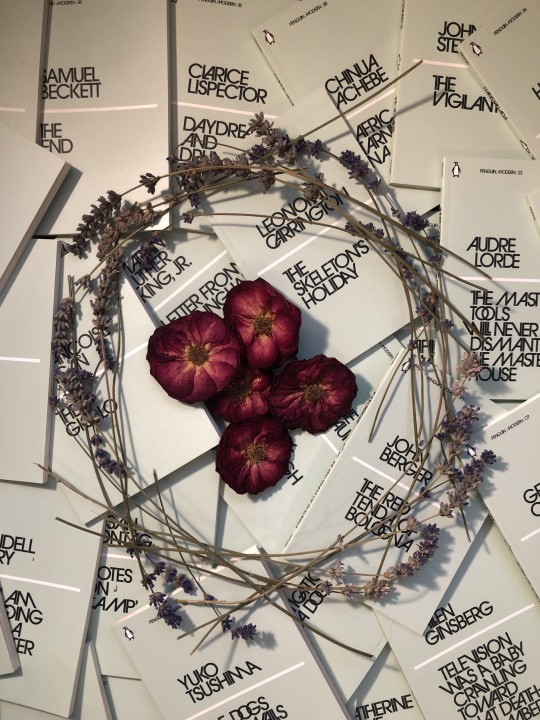

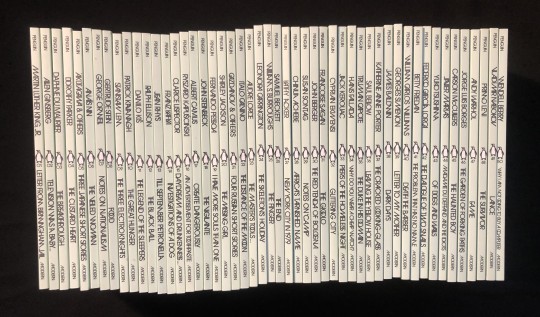
Part 1: This is a collection of short stories, 50 penguin's modern classics.
LETTER FROM BIRMINGHAM JAIL by MARTIN LUTHER KING, JR. This landmark missive from one of the greatest activists in history calls for direct, non-violent resistance in the fight against racism, and reflects on the healing power of love.
TELEVISION WAS A BABY CRAWLING TOWARD THAT DEATHCHAMBER by ALLEN GINSBERG. Profane and prophetic verses about sex, death, revolution and America by the great icon of Beat poetry.
THE BREAKTHROUGH by DAPHNE DU MAURIER. A scientist's attempt to solve the mystery of life after death has chilling consequences, in this eerie tale from a virtuoso writer of suspense.
THE CUSTARD HEART by DOROTHY PARKER. Wise-cracking and heartbreaking, these tales of women on the edge by the legendary wit Dorothy Parker show the darkness beneath the surface of the Jazz Age.
THREE JAPANESE SHORT STORIES by AKUTAGAWA & OTHERS. Three beguiling, strange, funny and hair-raising tales of imprisonment, memory and atrocity from early twentieth-century Japan.
THE VEILED WOMAN by ANAÏS NIN. Transgressive desires and sexual encounters are recounted in these four pieces from one of the greatest writers of erotic fiction.
NOTES ON NATIONALISM by GEORGE ORWELL. Biting and timeless reflections on patriotism, prejudice and power, from the man who wrote about his nation better than anyone.
FOOD by GERTRUDE STEIN. From apples to artichokes, these glittering, fragmented, painterly portraits of food by the avant-garde pioneer Gertrude Stein are redolent of sex, laughter and the joy of everyday life.
THE THREE ELECTROKNIGHTS by STANISLAW LEM. From a giant of twentieth-century science fiction, these four miniature space epics feature crazy inventors, surreal worlds, robot kings and madcap machines.
THE GREAT HUNGER by PATRICK KAVANAGH. By turns tragic and comic, irascible and exalted, these are some of the most beloved poems by a writer who transformed Irish verse.
#nejj bookblr#books#book review#bookworm#bookish#book blog#book haul#book photography#academia#classic academia#dark academia#reading#english literature#photography#gothic#literature#lit#fiction#bookblr#booklr
24 notes
·
View notes
Text
hiiiii everyone im going to make you look at art <3 okay <3


first up we got two photos from august sander's people of the twentieth century, a decades long project he never finished aimed at identifying and organizing the "types" of people in early twentieth century germany. in photos for this project he usually identified people along socio-economic and geographic lines. on the left we have officer, world war i, cologne (1914) and on the right we have boxers, cologne (1928). museum had a bunch of sander on display and they paired it with the shortcut to the systematic life: superficial life (2002) by tsui kuang-yu, which is outside the scope of this post but super interesting so i encourage everyone to look it up lol
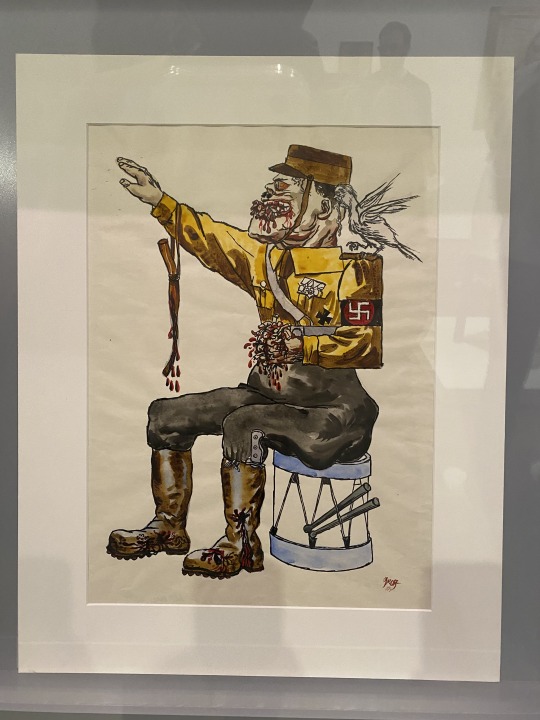
up next: the junkers officer (1934) by george grosz, another artist associated with neue sachlichkeit/new objectivity. im not well versed in german art but recently i have been so intrigued by leftist art of the weimar republic and it felt simply serendipitous. unfortunately by the time i saw this the museum was closing in 15 minutes so i had to rush out </3 SAD
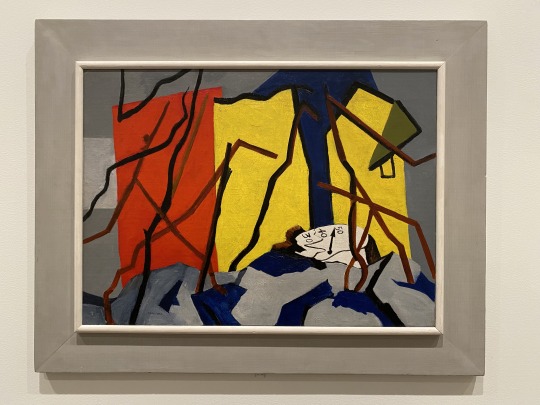
this is air war (1944) by ralston crawford. first time i heard of this artist! during wwii he served as chief of the visual presentation unit of the weather division of the army air corps in washington dc and southeast asia.
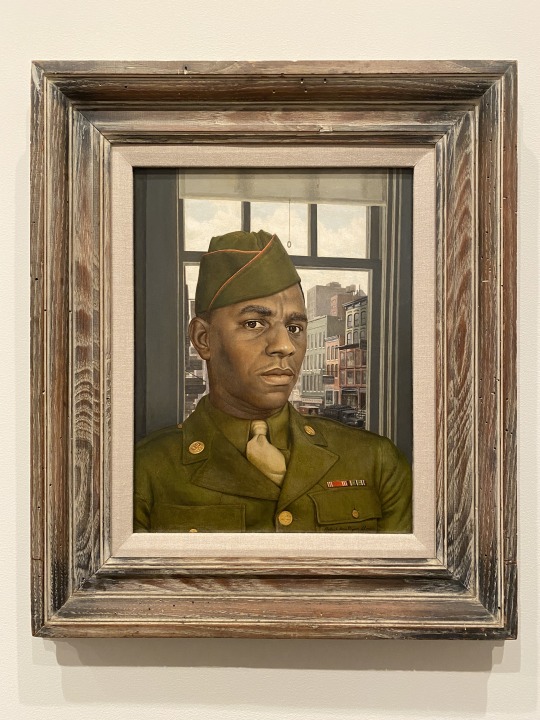
negro soldier (1945) by robert smullyan sloan. sloan was drafted in 43 and illustrated army educational materials and posters for war bonds. the wall label says the title was given by the artist, which makes me think sloan didn't personally know this guy, which makes me very curious about the circumstances of its production. no name is given to the sitter, but he served in the european-african-middle eastern campaign in the army and was awarded a good conduct medal. sloan has a drawing at the met (station hospital [1943-44] ), but unfortunately i can't find much else about him online that might help contextualize this painting.
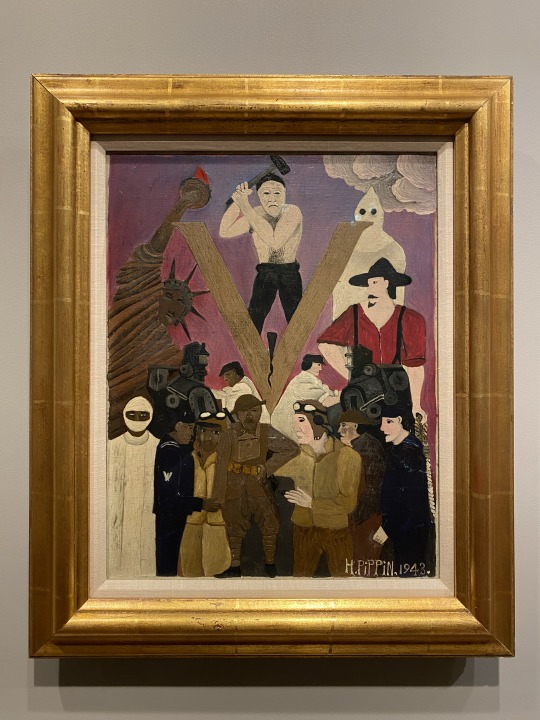
i think it pairs really well with this horace pippin from 1943 called mr. prejudice. pippin served in wwi with the harlem hellfighters, and the soldier at center might be a self portrait. he has a pretty good amount of paintings about the war actually -- i normally associate him with landscapes for some reason, though i think thats just because the pippin at my local art museum is a landscape lmao. his illustrated war journals are digitized at the archives of american art if you want to check it out!
up next are some pieces of interest that i want to share but about which i otherwise have little to say
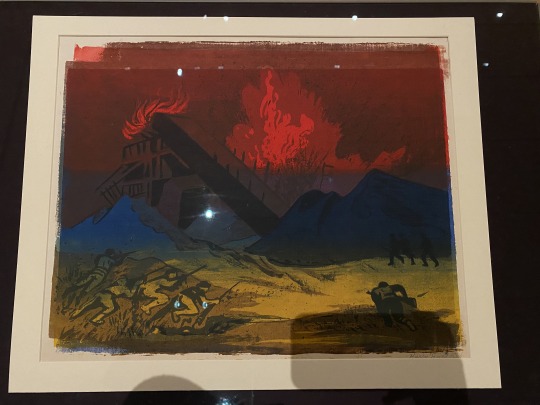

L: untitled (military maneuvers at an abandoned mine) (1940-42) by harry gottlieb
R: italy goes to war (1941) by arthur dove
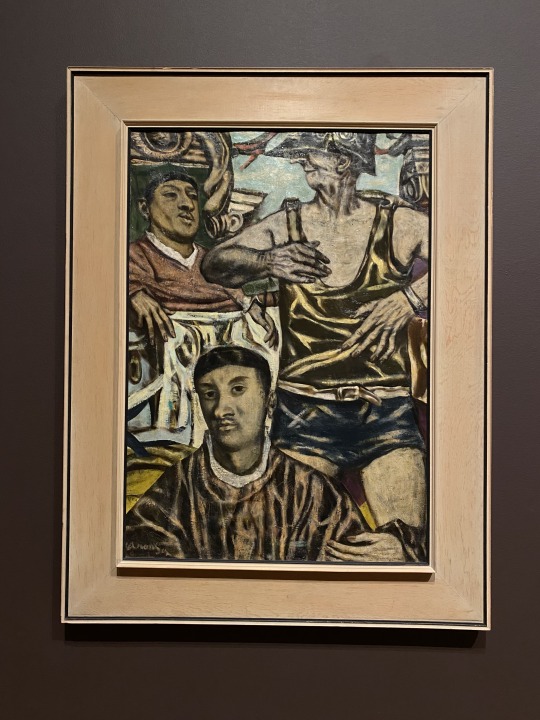
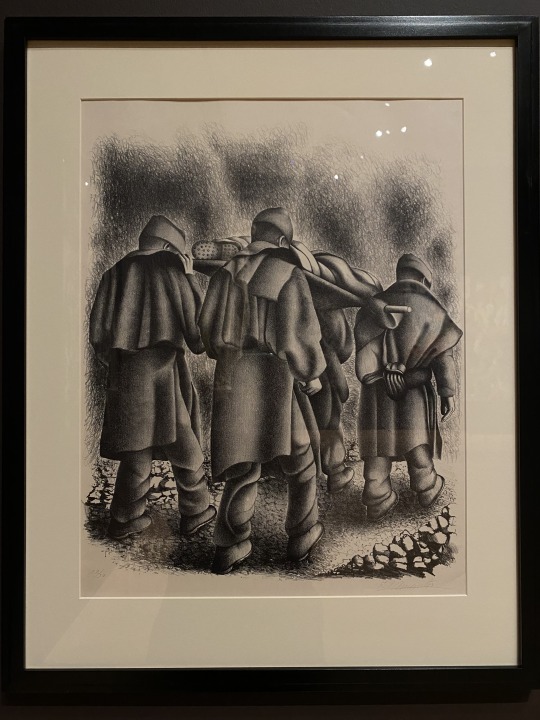
L: christ before pilate (1949) by david aronson. wall text wants us to note the soldier's helmet is german
R: the funeral (1949) by francisco dosamantes
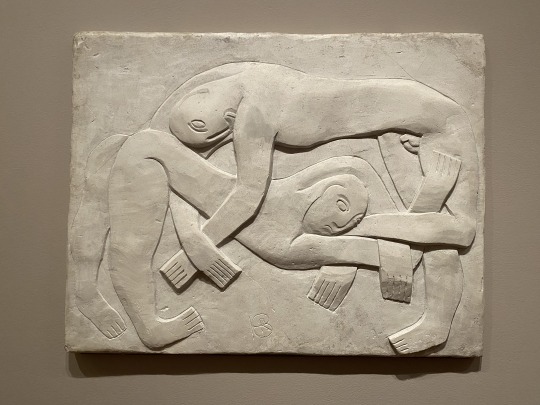
ending with this delightful 1914 the wrestlers by henri gaudier-brzeska, whom the label quotes as saying, "i went to see the wrestlers -- God! i have seldom seen anything so lovely... they fought with amazing vivacity and spirit, turning in the air, falling back on their heads, and in a flash were up again on the other side, utterly incomprehensible." something about wrestling/boxing that make men gay as fuck. beautiful
15 notes
·
View notes
Note
ds9 holosuite adventure in the tv show of your choice
Becca, you know me well.
--
"I'm reminded of a Cardassian equivalent," Garak decides, and Julian considers becoming a vedek.
"Do tell," he says, looking down at himself. Twentieth century street clothes. They look fine. For versimilitude, they should be women's clothes, but Julian doesn't like that even to play. Garak, meanwhile, might be persuaded into a perfectly tasteful dress just as nice as one of his own manufacture, if he could get past whatever Cardassian thrice-repetitive literary equivalent Julian is just about to receive chapter and verse and forty-four more volumes on.
"The Cardassian writer Ankoja of Prim," Garak says. "She spoke of a race of beings who, upon exposure to sunlight, took on a greenish patina and, ah... combusted. It was thought at the time to be something in the nature of a surfeit of copper ions in the blood."
"That's not how anything works," Julian says. "Could you kill them with a piece of pointed wood?"
"I don't suppose anyone ever tried." Garak looks perturbed. "They were law-abiding citizens, seeking a cure... my dear Doctor. Are you saying that the purpose of this game is to kill these unfortunate... creatures?"
"The clue is in the name!" Julian yells. "You slay the vampires! And then they die! And that's the game!"
"It sounds terribly bloodthirsty."
"No," Julian says, "that's them. The vampires. Who are bloodthirsty!"
"Everyone must live, surely," Garak says.
"They don't live. They're dead. Undead."
"Why do we need to kill them, then?" Garak asks. "If we need to kill them in any case, which frankly I doubt. I'm reminded of another Cardassian equivalent, the Pherran Scholars of the northern provinces, who wrote in the ethical mode..."
Julian wonders if the Dominion need doctors, and if they do, where to apply.
35 notes
·
View notes
Text

"They don’t know shit. You’re not gonna get hurt. You’re fuckin’ Beretta. They believe every fuckin’ word, ’cause you’re super cool."
Attempting some painting while drawing Rosinante as one of my other favorite double agents.
#i'll love you if you recognize the reference#mine#verse: twentieth century blues (modern)#donquixote rosinante
4 notes
·
View notes
Text
Don’t Look Back - Part 1: Original Run
CW: Major Character Death, blood and gore, interrogation, drowning, mourning
On the night between the 7th and 8th of June 1589, Hob Gadling got drunk like he never had been in Sir Robert Gadlen's life. In any of the three successive Robert Gadlen's lives, to be exact. Unlike any other previous night of debauchery, though, he did on excellent wine. He had ordered more than twice the amount he needed to get wasted, since he had assumed his patron would drink his share, but no, he had spurned Hob, preferring to spend the night with stupid talentless Will Shaxberd. What did the little punk have that Hob did not? He wasn't even good at writing! At least Hob knew better than to inflict his verses onto anyone.
The twentieth pasty was as delicious as the first one, though Hob had vomited some of them at one point. He felt full and drunk, and mysteriously still empty and enraged. He waved to the waitress to get more wine, and he saw hesitation in her eyes. He probably looked more drunk than he really was. Who cared? He was paying a small fortune for tonight's banquet, they could keep their judgments and serve him.
When he stumbled back to his room, it was after a difficult time of climbing the stairs and finding the right door. He fuddled with the doorknob and cursed the man who had made it, as if his ebriety wasn't the reason he struggled to open it. He finally managed to open it, entered the darkened room, and battled with the mechanism again to lock the door one handed, as his other hand was holding the candle. Then he turned toward the bed and froze.
There was someone in the room. A stranger was lounging on Hob's bed. At first, Hob's drunken brain told him it was a cardinal. They were dressed entirely in red. Then, the other part of Hob's brain caught up, suggesting maybe a cardinal wouldn't wear such suggestive garments. The dress was in a style that Hob had never seen, following closely the shape of the body in a way that was very close to indecent. Though the skirt fell down to the ankles, on each side a long slit went up to the waist, revealing the naked skin of the narrow hips. If the dress was definitely feminine, the body wearing it was a lot more ambiguous, with a flat chest and narrow waist.
"Hello, Hob Gadling," the stranger said.
They were smiling, though it looked more like a cat baring their teeth in front of a mouse.
"How…I am Sir Robert Gadlen. This must be a mistake. Please leave my room immediately."
They chuckled, and made no move.
"I know who you are, Hob Gadling. I've been watching you for centuries. Such a will to live, I couldn't resist."
Hob remained silent. The adrenaline rushing through his body was sobering him up fast. This person, whoever they were, knew about his secret. They were immortal as well. What did they want? Were they here because Hob's other patron had left?
"I know everything about your deal with my sibling, meeting him once a century to tell him about your pitiful human life. But he couldn't even sit and listen, could he? He was always shallow and selfish, only interested more in stories than in the people telling them or living them."
Sibling? Hob was dealing with a being not only immortal, then, but powerful enough to grant immortality… or take it away? He knew enough Greek and Roman mythology to fear being taken between a godly sibling rivalry. These stories never ended well for humans.
"What do you want?" he asked, finding a bit of courage in the ebriety that was leaving him.
"What do I want? That's not the question, is it? The question is what you want. Or rather, what will you want, you see. You wanted to save your only friend, you were ready to give up everything for him. How could I not deliver, when you wanted like that?"
What the hell was this? It was madness. Who were they talking about? Who was Hob's only friend that needed saving?
He was about to ask, but was interrupted. The stranger had gotten up from the bed, and was slowly walking to Hob. Instinctively, Hob backed off step by step until he hit the door. The door that he had locked earlier, not knowing the danger was already inside. Not that a lock would stop a god.
"Unlike my brother, I know how to show appreciation."
The mysterious being drew their hand back, as if preparing a blow. Hob steeled himself, unable to move under the gaze of the two golden eyes.
The blow never came. Instead, the hand passed right through his skin into his chest like a knife in water. It was not painful, though it was incredibly disturbing. The slender fingers moved underneath Hob's ribs and closed around his beating heart. Hob could feel them constrict it with each beat.
"Are you going to kill me?"
"Oh, no, Hob Gadling. I'm going to make you live. I'm going to give you every chance to get what you will. Enjoy."
There was something in their other hand. Hob had very little chance to see what it was before it disappeared into his chest. It had looked like the clock dials of the new German clocks, but bizarrely crooked and twisted. Then the cold metal came into direct contact with his beating heart, and Hob lost every thought and word.
The stranger had come closer, their cheek against Hob's and their mouth close to his ear. The position was intimate, but less than having both their hands burrowed inside his ribcage.
Painfully slowly, they pushed the metal apparatus into his heart until Hob felt like the two were, impossibly, occupying the same space. Hob's heart stopped, and Hob felt like it had imploded inside his chest. The cold seized him entirely, and he lost consciousness.
---
Hob Gadling died for the first time on the eleventh of November 1621, drowned in a lake.
He’d always thought he’d die by the sword, or most likely shitting himself to death in a ditch, somewhere along his life as a bandit. He had no shortage of possible causes of death, from tavern brawls to pitched battles, from dysentery to pox, from infected wounds to bad head injury. He’d been almost surprised to survive at all, to dodge death again and again with the most insane of luck. Almost, because he had defied Death, once, drunk as a skunk. He had claimed to everyone who would hear that Death was stupid and he would have no part of it. And somehow, Death had heard him, because from that day, Hob had survived every war, every epidemics, every accident thrown his way, until decades slowly turned to century and Hob’s hair remained obstinately brown.
Hob had even met Death twice again. Once in 1489, as agreed one hundred years before when they had struck their deal, and once in 1589, as they renewed their deal. Hob had told them, when the pain had become too unbearable. Described Death’s cold beauty, the thin black and white shape of a man with eyes too deep and smile too sharp. He’d told them Death was no Devil, they had said so. Yes, he made a bargain to gain immortality. No it didn’t involve the lives of his wife and son. He didn’t really know what it involved, except that he had to live forever and speak to Death once every hundred years. After days of never ending pain, and no sign of him dying, he’d told them everything he could think of.
That’s how Hob Gadling ended up chained and attached to a wooden perch, one cold morning of November. Big Humphrey, who was the miller’s son and the strongest man in the neighbourhood, was sitting in a rowboat on the lake and holding the perch above the water, ready to dunk Hob until he was either dead and innocent, or alive and guilty. What they would do, if he emerged alive and guilty, Hob did not dare imagine. Sitting next to Humphrey was Edward, the prosecutor, the man who’d relentlessly murmured question after question in Hob’s ear as Hob cried in pain. Hob didn’t think there was a thing in the world he hated and feared more than his deceptively soft voice, encouraging Hob to damn himself while he transcribed. The same soft voice sounded surreal in the fog, as it ordered Hob to be dunk into the water.
Hob protested. It was a mistake. His mouth was instantly filled with murky water, burning his lungs. Hob tried to cough, only to inhale more of it. The water was icy cold, seizing his muscles as he thrashed to escape his restraints. Hob could not die. It was impossible. He had a deal with Death. How long would it take, for the priest, to deem it enough? Every moment of it was agony.
It didn’t matter. Hob couldn’t die. He would have no part in it. He was over two hundred years old. He felt at peace. He would not die, because it was impossible. He only had to wait. He stopped himself from trying to breathe. He didn’t need to breathe. He was calm.
He was wrong.
17 notes
·
View notes
Text
x. PINNED POST THING
FIC MASTERLIST:
marginalia
WIP. 273k/? E. Canon-divergence dystopian AU. Wolfstar, side Dorlene and eventual Jily.
history books forgot about us
Complete. 25k. E. Ted/Andromeda prequel set in the marginalia verse.
ocho kandelikas
Complete. 11k. T-E. Hannukah anthology of 8 standalone one shots in various timelines and verses. Wolfstar, various side characters and ships.
until our ribs get tough
Complete. 4k. M. Prequel Remus and Lily friendship slice of life set in the marginalia verse.
twentieth century boy
Complete. 3k. E. The Sirius-on-a-leash fic. Wolfstar.
the verge
Disconnected one-shots. Mainly Wolfstar.
SOME TAGS:
x marginalia blogging
x mwpp in shorts agenda
x lesbian wolfstar
x trans remus lupin hours
x drabble tag
FAQ:
Can I bookbind your fics?
Please read this so, so carefully, because it's important.
If you are designing, printing, and binding the fic yourself for the purpose of keeping it or gifting it on to a friend, then yes. Absolutely. Nothing would make me happier. Fandom is punk and community-oriented and exists outside of the capitalist economy, and I would love nothing more than to see the results of your incredible craftsmanship.
But if you're using Lulu or another for-profit printing company to do it, if any money is changing hands at any point in the process, then the answer is a resounding fuck no. If you're confused by this policy, I'm begging you to take the time to read on here about why this trend is such a danger to all of us who write and read fanfiction.
Can I translate/record a podfic of your fics?
Ask me first, but I can't imagine a reason I wouldn't say yes. Just so long as they stay on AO3 and link back to the original fic where you have the option to pick This work is a remix, a translation, a podfic, or was inspired by another work. Please don't upload to Spotify.
Can I put your fic on Wattpad or another fic hosting platform?
No.
Can I put your fic on Goodreads or StoryGraph?
Absolutely not.
Can I feed your work to ChatGPT or another AI?
No! What's wrong with you?
Do you have an update schedule?
No. My current WIP is usually updated once or twice a week, but sometimes the wait is longer than that. I have a job and health issues and sometimes even a social life, and I do this on my own time because it brings me joy.
Can I write fic/draw art/create something else inspired by your fics?
Yes! And I hope you understand what a compliment that is! Like I said before, fanfic is punk and community oriented and this is a folkloric tradition. You actually really don't need my permission to do this, but I would ask that any fic stay on AO3 and link back to the original fic where you have the option to pick This work is a remix, a translation, a podfic, or was inspired by another work. For anything else, I'd love to see the results of your creativity, and would just ask that due credit and a link back to the original fic are clearly present somewhere.
XO ZO
#what's that? a proper pinned post?#it's more likely than you think#wolfstar fic#remus lupin#sirius black#my fic#zo chats
122 notes
·
View notes
Text
~ Character Info Sheet (MAIN VERSE)
name: Khan Noonien Singh
name meaning: Khan, which is more popular as a surname, is a Turkish boy's name meaning "prince". Khan is a shorter form of Khagan, and was originally a historic title given to military chiefs and rulers. Noonien is of Chinese origin and means "gifted one", though it's unclear whether this is accurate or not. Singh is derived from the Sanskrit word सिंह (IAST: siṃha) meaning "lion", and is used in the sense "hero" or "eminent person".
alias/es: John Harrison, created and given to him by Admiral Marcus as a smokescreen to hide his true identity.
ethnicity: Confidential information
one picture you like best of your chara:

three h/cs you've never told anyone:
During his time under Marcus' command, Khan was not only forced to create powerful weapons and design an entire warship fitting to Marcus' demands, but he was also forced to go through mental as well as physical abuse. Marcus used his crew to control him, threatened Khan to take their lives if he were to disobey; Two of his people died this way, leaving Khan devastated and broken.
Khan is, in fact, not human - this information is confidental, however, and the few papers existing from the time he was risen are locked up somewhere in the archives. Marcus knows, however, with him being of high rank - which is precisely why he wanted to keep and use Khan for his purposes.
During his time as a ruler in between 1992 and 1996, Khan maintained a close relationship to a selected few of his following (mostly males, with a few rare exceptions) - the mentioned relationship included connections of sexual kind, but didn't really turn into romantic love-interests. They all enjoyed each other's company together, as a group, on more than just one occasion.
three things your character likes doing in their free time:
Reading. He enjoys a lot of different genres, prefers the feel of real paper between his fingers, but will also use whatever electronic device is offered to him to entertain himself.
Stargazing. It reminds him of his childhood, back when he'd been risen in the twentieth century; The stars have always fascinated him, perhaps it has to do with his origins.
Cooking. He rarely gets the chance to do so, but Khan enjoys the logical but also creative approach of creating dishes - he's a big fan of the asian as well as indian cuisine.
eight people your character likes / loves: His crew, obviously. Seventy-two people, still within their cryotubes; He would do anything for them, as he knows they would do anything for him in return. He considers them his family, his friends, people he holds most dear.
Besides them, he doesn't keep any close connections at the current time. While residing under Marcus' command, he didn't really care about anyone else, only had the occasional chat with others working at Section 31, but nothing of significant nature.
The rest is entirely thread-dependent; Khan is about to connect to @darehearts, he also feels very close to @sxbaist (in every single Verse) and, besides that, is starting to connect tentatively to a few other muses. (Also very verse-dependent; In his MCU verses he's getting relatively close to @bloodstainedstar and is already deeply in love with @mehrere-musen - in one alien verse he is friends with @noblehcart and in another alien verse he is also deeply in love with @ssolessurvivor)
two things your character regrets:
Having put his people into the torpedoes he'd designed. Back when he'd done it, there hadn't been any other way available for him to try and smuggle them into safety - yet, with how the events unfolded in the end, part of him regrets that he's executed his own plan and, sadly, got discovered in the process, forcing him to leave them behind while escaping alone.
Having put himself as well as his crew into cryotubes to begin with. Back when all of them had been forced into exile, he'd planned for them to sleep a few years while their ship drifted through space, far away from earth, so as to allow them all to resume their lives at another point. That his own cryotube malfunctioned, didn't wake him up within the estimated timespan, he obviously didn't account for; Ten of his friends lost their lives because of that, and, in the end, Marcus found them over two hundred years after the Eugenic Wars had happened, resulting in the whole desaster that followed.
Phobias fears your character has:
The fear of losing someone he loves, either plantonic or romantic. Because of what he's gone through while being held hostage by Marcus, made to witness the death of two of his people caused by the Admiral's hands, Khan ever since experiences the overwhelming fear of being unable to keep someone safe and, therefore, lose them forever. Whoever gets close to him, he intents to protect, and he might become a bit overly protective because of his mentioned fear.
A mild 'fear' of doctors / scientists. It manifests less in actual fear but more in varying stages of discomfort; Because of what he went through as a child as well as under Marcus' command, he's not too fond of being handled by either of them.
tagged by: no one
tagging: @bloodstainedstar because I don't think you did this yet. :)
#headcanon#(since the last time i filled this out is VERY alien verse specific... i decided to do it for my main verse too!)#(so here it is. NEW Khan character sheet heh)#(♥)#(i hope you guys dont mind me having tagged you)
11 notes
·
View notes